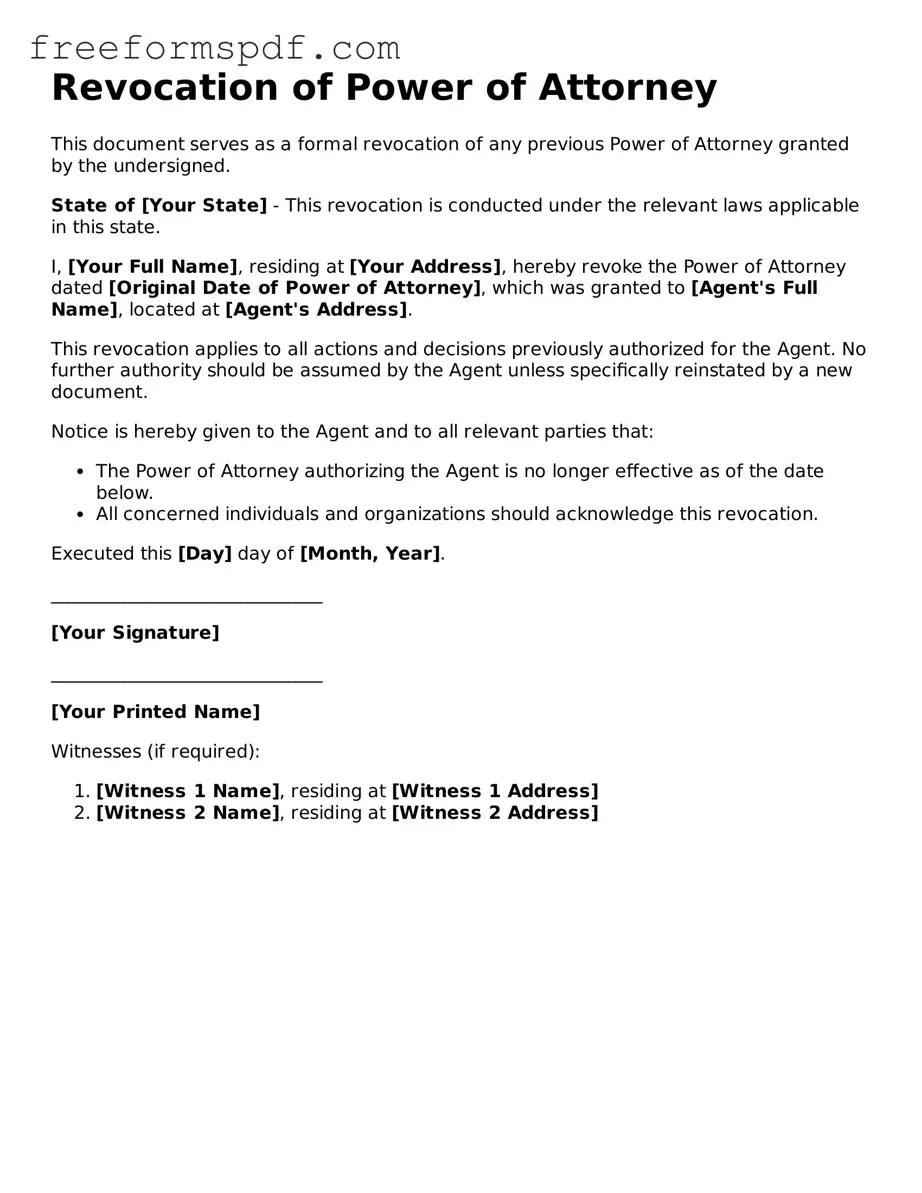Revocation of Power of Attorney Document
Common mistakes
-
Failing to Date the Form: It is essential to include the date when the revocation is signed. Without a date, there may be confusion about when the revocation takes effect, leading to potential disputes.
-
Not Identifying the Original Power of Attorney: When completing the revocation form, it is crucial to clearly reference the original Power of Attorney. This includes providing the name of the agent and the date the original document was executed. Omitting this information can create ambiguity.
-
Neglecting Witness Signatures: Some states require that the revocation be witnessed or notarized. Failing to have the appropriate signatures can render the document invalid, making it ineffective in revoking the original Power of Attorney.
-
Not Distributing Copies: After the revocation is completed, it is vital to distribute copies to all relevant parties, including the original agent and any institutions that had the original Power of Attorney on file. Without proper notification, the original agent may continue to act under the assumption that they still have authority.
Learn More on This Form
-
What is a Revocation of Power of Attorney form?
A Revocation of Power of Attorney form is a legal document that allows an individual to cancel or revoke a previously granted power of attorney. This means that the person who had the authority to act on your behalf can no longer do so. It's important to use this form if you no longer trust the agent, if your circumstances have changed, or if you simply want to appoint someone else.
-
When should I use a Revocation of Power of Attorney form?
You should consider using this form if you wish to terminate the authority given to your agent. Situations may arise such as a change in relationship, the agent's inability to perform their duties, or if you decide to appoint a new agent. It is crucial to act promptly to avoid any confusion regarding who has the authority to make decisions on your behalf.
-
How do I properly execute a Revocation of Power of Attorney form?
To execute the form, you must fill it out completely and sign it. It is advisable to have the document notarized to ensure its validity. Once completed, you should provide a copy to your former agent and any institutions or individuals who may have relied on the original power of attorney. This helps to ensure that everyone is aware of the revocation.
-
Can I revoke a Power of Attorney if I am incapacitated?
If you are incapacitated, revoking a power of attorney can be complicated. Generally, you must be mentally competent to revoke a power of attorney. If you are unable to do so, a court may need to become involved to determine your wishes. In such cases, it is advisable to seek legal assistance to navigate the process.
Misconceptions
Understanding the Revocation of Power of Attorney form can be tricky. Here are six common misconceptions that people often have:
- It’s not necessary to revoke a Power of Attorney. Many believe that once a Power of Attorney is created, it remains in effect indefinitely. However, revoking it is essential if you no longer want that person to act on your behalf.
- You can’t revoke a Power of Attorney if you are incapacitated. Some think that if they become incapacitated, they lose the ability to revoke a Power of Attorney. In reality, as long as you are mentally competent at the time of revocation, you can still make that decision.
- Verbal revocation is enough. People often believe that simply telling someone they no longer want them to act as their agent is sufficient. However, it’s best to provide a written Revocation of Power of Attorney to avoid any confusion.
- Revoking a Power of Attorney cancels all related documents. Some think that revoking one Power of Attorney automatically affects others. Each document stands on its own, so revoking one does not impact others unless specifically stated.
- You don’t need to notify the agent. Many assume that they don’t have to inform the person they appointed. In fact, it’s important to notify them to prevent any misunderstandings or unauthorized actions.
- Revocation is a complicated process. Some people believe that revoking a Power of Attorney is overly complex. In reality, it’s a straightforward process that involves filling out a form and notifying the necessary parties.
Understanding these misconceptions can help ensure that your wishes are followed and that you maintain control over your legal and financial matters.
Other Types of Revocation of Power of Attorney Forms:
Power of Attorney Sample - Gives peace of mind that your property matters are handled even when you are away.
In New York, a Power of Attorney form is crucial for empowering someone to make financial or legal decisions on your behalf, ensuring that your interests are protected. For those seeking a reliable template to facilitate this process, NY Templates offers a resourceful solution that can simplify the creation of this important document.
